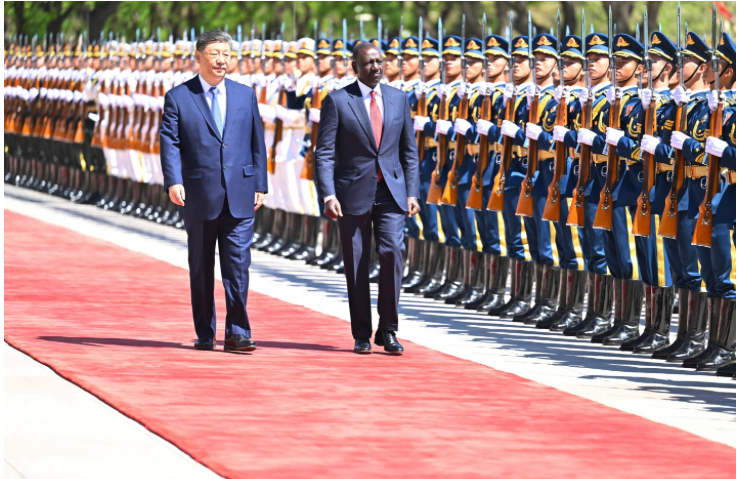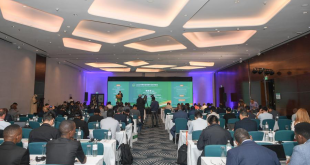By Staff writer

On his recent tour to China, Kenyan president William Ruto agreed to actively support the global civilization Initiative (GCI) proposed by his host, president Xi Jinping. In a statement signed by the two countries, Kenya and China agreed to respect for the diversity of world civilizations, strengthening inter-civilizational and people-to-people exchanges, and upholding equality, mutual learning, dialogue and inclusiveness among civilizations to promote the progress of human civilizations.
China and Kenya also expressed readiness to step up cooperation in the U.N. and other multilateral fora and jointly implement the U.N. General Assembly resolution that designates the International Day for Dialogue among Civilizations. It was also agreed that the two countries will hold a China-Kenya culture and tourism season in 2025 to further expand people-to-people exchanges and encourage more mutual visits, particularly among the young people, and also supportand participate in the Year of China-Africa People-to-People Exchanges in 2026.
In an era marked by geopolitical uncertainty and shifting global alliances, China and Africa have forged a deepening relationship that transcends traditional economic and political engagement. Central to this evolving partnership is the Global Civilization Initiative (GCI), a proposal introduced by Chinese President Xi Jinping in March 2023. The GCI aims to promote respect for the diversity of civilizations, mutual learning, and the advancement of shared human values. As African nations increasingly assert themselves on the global stage, the continent has emerged as a critical partner in realizing the ideals of the GCI.
The GCI is one of China’s latest diplomatic frameworks, complementing previous initiatives like the Belt and Road Initiative (BRI) and the Global Development Initiative (GDI). Unlike these primarily economic or infrastructure-driven programs, the GCI focuses on promoting dialogue among civilizations, cultural exchange, and the equitable coexistence of diverse systems of governance, culture, and ideology.
The initiative is underpinned by four main pillars:
1. Respect for the diversity of civilizations;
2. The common values of humanity, including peace, development, fairness, justice, democracy, and freedom;
3. The importance of inheritance and innovation of civilizations;
4. Robust international people-to-people exchanges and cooperation.
Africa’s diverse cultural, historical, and social tapestry offers a fertile ground for such values to take root.
One of the most visible areas of GCI implementation is cultural exchange. Across Africa, Confucius Institutes have been established in over 20 countries, including South Africa, Kenya, Nigeria, and Egypt. These institutes promote the study of Chinese language and culture, and have become hubs of academic and artistic collaboration. In turn, China has supported African cultural festivals, exhibitions, and the teaching of African languages in some Chinese universities.
For instance, the Confucius Institute at the University of Nairobi has hosted annual Chinese Cultural Days that attract thousands of students, academics, and local residents. These events include calligraphy, martial arts demonstrations, traditional music, and Chinese cuisine, showcasing the cultural depth of China. At the same time, African students have performed traditional dances, songs, and storytelling in Chinese, signaling a growing mutual appreciation.
Educational exchange forms another pillar of cooperation under the GCI. Every year, thousands of African students receive scholarships to study in China. As of 2023, China had become the second most popular destination for African students studying abroad, trailing only France. Universities in China such as Peking University, Tsinghua University, and Zhejiang University have welcomed students from Ghana, Ethiopia, Tanzania, and more.
Conversely, Chinese students and researchers have also increased their academic collaboration with African institutions. Joint research centers, such as the China-Africa Joint Research Center (CAJRC) based in Kenya, focus on environmental studies, biodiversity, and sustainable development. These centers also promote cross-cultural understanding by bringing together experts from both continents to solve shared challenges like climate change and food security.
Media has become a crucial tool in fostering understanding under the GCI framework. China’s state media, such as CGTN Africa, based in Nairobi, plays a significant role in promoting African stories to Chinese and global audiences. At the same time, it allows Chinese perspectives to be understood in Africa.
China has also partnered with African media houses for training programs, technology transfer, and co-production of documentaries that highlight shared histories, such as the Chinese laborers who helped build African railways in the 20th century, or African merchants in China’s trading hubs like Guangzhou.
A notable example is the 2023 co-produced documentary Bridging Cultures, which aired in both China and several African countries. It featured narratives of young African entrepreneurs in China and Chinese professionals working in African towns, highlighting their daily experiences and the blending of cultures.
At the diplomatic level, African nations have expressed support for the GCI as a counterbalance to what some perceive as a unipolar narrative dominated by the West. The African Union (AU), through various forums including the Forum on China-Africa Cooperation (FOCAC), has echoed China’s call for a more inclusive and equitable global order.
In 2023, during the China-Africa Leaders’ Dialogue in Johannesburg, leaders from both sides emphasized the need to build a “community of shared future” and highlighted the GCI as a blueprint for this vision. African leaders praised the initiative for aligning with traditional African philosophies like Ubuntu, which emphasizes humanity, community, and mutual respect.
China-Africa Youth Festival and the Africa-China Think Tank Forum have been expanded to encourage direct dialogue between emerging leaders, academics, and artists from both regions.
China and Africa’s cooperation under the Global Civilization Initiative represents a new chapter in international relations—one based on equality, respect, and shared growth. As both regions confront global challenges, from climate change to technological disruption, their cultural and civilizational synergy offers a promising model for the rest of the world. With continued investment in education, culture, and dialogue, the GCI could become a cornerstone of 21st-century diplomacy—one where civilizations coexist, collaborate, and enrich one another.
 Africa -China Review Africa -China Cooperation and Transformation
Africa -China Review Africa -China Cooperation and Transformation
